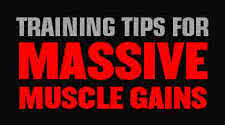Making Gains in Muscle Mass - Advice from Reg Park

Sometime the Advice of a Legend is the Best Medicine
Why do so many bodybuilders fail to make adequate gains? Having been involved in the world of bodybuilding since 1945,1 have been in the position to observe the training of
literally thousands of bodybuilders and I never cease to be amazed that so few make the gains they not only should make, but which they are capable of making.
From their initial introduction to body-building, youngsters from the age of 14 and 15 right up to young men in their early 30's sign on at gyms with the sole aim to improve
their physiques, and when, after training for a few weeks, they fail to attain the improvements they seek, they stop training. Some may return to training at a later date,
and others stop permanently.
A great deal has been written about the importance of genetic-selecting the right parents when the question of attaining success in sports arises, and quite frankly bodybuilding
is no exception. If you are the offspring of physically well-built parents, the prospect of your making faster and better gains than your friends whose parents are less sturdy
is unquestionable. However, that does not mean the less fortunate genetically endowed offspring cannot make marked improvements in their physiques. By applying intelligent
principles of bodybuilding, anyone can make improvements. What are the intelligent principles of bodybuilding?
1. If you are in the fortunate financial position whereby you are able to afford to hire the services of a private trainer to take you through your workout (i.e. one on one),
you are certainly starting off on the right track. The vast majority, however, are unable to afford this form of personalized training; therefore, it is essential that you not
only visit the various gyms in your area but also ask relevant questions from those who are already training at the gyms. Check out whether there is a trainer/coach on the gym
floor actually coaching and correcting and not just sitting behind the desk with his feet up reading a magazine. Observe the relationship between the trainer/coach and the
pupil. Determine what "the vibes" in the gym are like.
In my experience, unless the trainer is a one-on-one private trainer, the average bodybuilding trainer/coach who is "on the floor" for six or more hours at a time cannot sustain
energy, enthusiasm and motivation. He cannot give of his best for long periods if he is not rewarded enough financially. Maintaining a high-interest enthusiasm-motivated level
to members day after day is not easy unless one's efforts are being adequately rewarded.
Don't pay too much attention to the sales spiel of the person behind the desk who is trying to sign you on. Speak to the trainer actually on the floor about the type of training
and attention you can expect to receive from him or her. You must have complete respect and confidence in your trainer. If, after having spoken to the trainer, you are convinced,
then - and only then - sign on.
If you are a beginner (i.e., one who has less than three months' experience in body-building) don't under any circumstances sign up unless the gym has a trainer/coach.
2. Once you have chosen the gym and duly paid your fees, the next step is to predetermine what your bodybuilding aims are. This is important because as well as the trainer/ coach
doing an assessment of your physique, it will help him considerably if you tell him not only about your medical history, but also what you would like to attain from your training.
Nothing is more disturbing for the trainer/coach to be told days or weeks after you have started training than that you have had ailments or injuries of which he was totally
unaware, and therefore some exercises he had outlined for you might well have aggravated the previous injuries. Obviously your aims must be realistic. If you hope to win the Mr.
Universe contest after only six months or less of training, forget about it.
3. Keep a record of your daily workouts and daily food and liquid intake, Obtain a facing-pages notebook and each day write the date at the top of the page and your bodyweight on
that date. Then list the exercises you do with the poundages used per set for each exercise. Every time you use a best poundage, circle it in red for easy reference at a later date.
Record your bodyweight only once a week at the same time. On the facing page record the time you eat and drink. On the left-hand side of the page note in detail what you eat and
drink next to the time of intake. From a calorie-count booklet record the total calories you take in each day.
Remember that since you are new to bodybuilding, you must increase your food and liquid intake if you are lean and wish to gain weight. Obviously you are now more active and therefore
use up more calories than you did before weight training. In order to gain size you must increase not only the poundages you use but also the amount of food and liquids.
4. Since our memories can (and do) play tricks on us, it is necessary to have photo-graphs taken of yourself every three to four months to record your actual progress. These
photographs taken at regular intervals together with your recorded measurements will give you a guide to your progress.
5. Provided you adhere to the foregoing principles, without doubt the most important factor if you wish to make good gains is regularity of training. Never miss a workout because
consistency and persistency pay off.
6. Finally, be confident that you will make gains. Try not to be impatient. Remember the rests between workouts are essential to allow the joints, ligaments, tendons and of course,
muscle tissue, time to recover from the previous workout and prepare for the next one.